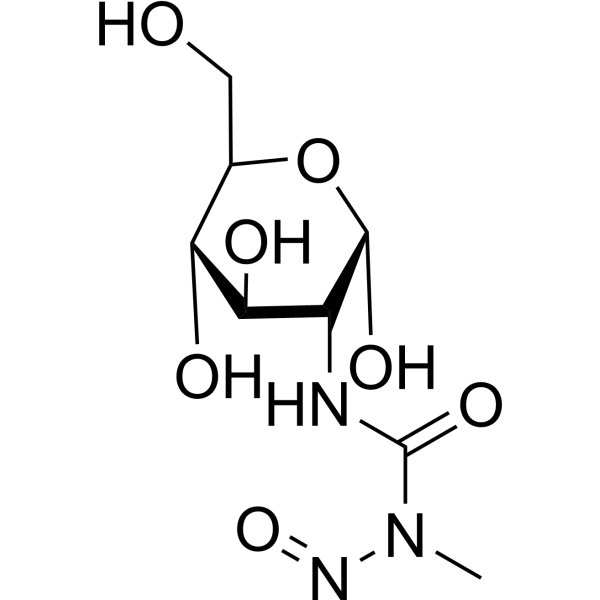Home
Products
Streptozotocin



| Product Name | Streptozotocin |
| Price: | Inquiry |
| Catalog No.: | CN06550 |
| CAS No.: | 18883-66-4 |
| Molecular Formula: | C8H15N3O7 |
| Molecular Weight: | 265.22 g/mol |
| Purity: | >=98% |
| Type of Compound: | Miscellaneous |
| Physical Desc.: | Powder |
| Source: | From Stre.achromogenes Uar.128 |
| Solvent: | DMSO, Pyridine, Methanol, Ethanol, etc. |
| SMILES: | CN(C(=O)N[C@H]([C@H]([C@@H]([C@@H](CO)O)O)O)C=O)N=O |
| Contact us | |
|---|---|
| First Name: | |
| Last Name: | |
| E-mail: | |
| Question: | |
| Description | Streptozocin is a potent DNA-methylating agent, with IC50s of 11.7, 904 and 1024 μg/mL in HL60, K562 and C1498 cells respectively. |
| Target | DNA alkylator[1] |
| In Vitro | Streptozocin (STZ) shows higher cytotoxic effect in vitro on hematological cell lines compared to Alloxan (ALX). ALX appeares not to be toxic for the studied cell lines with estimated IC50 values of 2809, 3679 or over 4000 μg/mL for HL60, K562 and C1498 cells, respectively. Streptozocin is more toxic, especially for the human myeloid leukemia cell line, HL60. The IC50 values of Streptozocin are 11.7, 904 and 1024 μg/mL for HL60, K562 and C1498 cells, respectively. Results also show that the murine leukemic cells are more resistant to Streptozocin and ALX cytotoxicity than human leukemic cells[2]. |
| In Vivo | Streptozocin (STZ)-injected mice show tendency to have lower body weight than that observed in animals injected with ALX. Streptozocin -injected mice have significantly fewer splenocytes (22.2±3.2×106; n=10) compared to mice injected with ALX (60.7±4.3×106; n=15; p=0.01)[2]. |
| Cell Assay | Human and murine cell lines are cultured in triplicate in 96-well plates at a density of 2×104 cells/well in the absence (untreated control) or presence of various concentrations of ALX (20-3000 μg/mL) or STZ (1-3000 μg/mL) for 48 h at 37°C under a humidified atmosphere containing 5% CO2. Cells incubated in complete media including dH2O in a final concentration of 0.1% served as control for solvent toxicity and cells incubated in complete medium are used as a control for the experiments. The effects of the tested drugs on tumor cell growth or viability are determined employing the MTT assay in accordance with the manufacturer's instructions. The IC50values (drug concentration that induces 50% inhibition of the cell growth) are calculated using the GraphPad Prism 4 program[2]. |
| Animal Admin | Mice[2] Male C57BL/6 mice (10-16 weeks) are used.The age group distribution in the mouse group treated with Streptozocin and ALX as well as controls is as follows: Streptozocin xenograft (n=7, median age 14 weeks), ALX xenograft (n=11, median age 15 weeks), Streptozocin non-transplanted (n=7, median age 14 weeks), ALX non-transplanted (n=15, median age 15 weeks).Male C57BL/6 mice are under inhalation anesthesia injected via the penile vein with ALX (75 mg/mL) or Streptozocin (180 mg/kg). Control group contain male C57BL/6 mice. Blood glucose levels and body weight are measured before injection, after 6 h, then daily after drug injection. Rats[3] Thirty rats underwent oophorectomy to induce menopausal status. Oophorectomy is performed under sterile conditions via a midline incision after anesthetization using intraperitoneal injection of ketamine hydrochloride (90 mg/kg) and xylazine (10 mg/kg). The incisions are closed with 3.0 polyglactin sutures. The remaining 10 rats formed the control group (Group 1). Ten of the 30 rats that underwent oophorectomy constituted the menopause control group (Group 2). Beginning 1 week after the operation, methylprednisolone (1 mg/kg) is injected daily until the end of the study to mimic steroid treatment for rheumatologic diseases in 10 rats (Group 3). Group 4 consisted of rats that received intraperitoneal administration of Streptozocin (50 mg/kg) to induce diabetes mellitus (DM) 1 week after the oophorectomy. Blood glucose level is checked 3 days after Streptozocin administration, and values >250 mg/dL are considered as positive for DM. |
| Density | 1.9±0.1 g/cm3 |
| Exact Mass | 265.091003 |
| PSA | 151.92000 |
| LogP | -1.33 |
| Storage condition | −20°C |